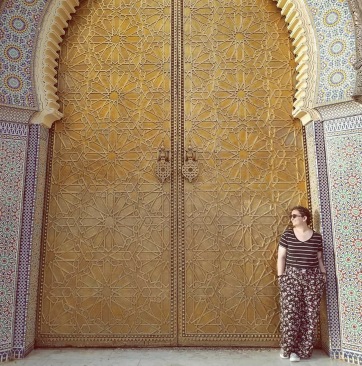
“These people, they’re the ‘salt of the earth’ kind of people,” a petite, New Yorker says.

Shannon, as she introduces herself, has lived in Fés, Morocco for nearly a year teaching English. She picked us out on the plane—two confused, and despite our best attempts at being low-key, American travelers—and took us under her wing, splitting a taxi with us and even guiding us through the Old Medina to our riad, an old Moroccan palace with a garden interior converted into a hotel of sorts.
“Fés is beautiful and terrible,” Shannon says with a smile as she leaves us. “Best experienced with your heart open.”
This encounter was our introduction to hospitality in a place my travel companion, Miranda, and I had both fantasized about for ages. I’m not sure where my interests in the North African country originated, but I’ve long imagined cliché camel rides under the desert stars and listening to recitations of prayers in melodic Arabic that drifts with the wind. I suppose my thoughts were but a product of exoticism of foreign cultures long present in Western media.
Needless to say, our visit to Morocco was vastly different than I could have ever imagined.

The Kingdom of Morocco was once a land of nomadic tribes, at times united, conquested, and triumphant, though not gaining full independence as a nation-state until the 1950s. There is a true clash of cultures present, and Arabic, particularly the Moroccan dialect of Darija, and French (thanks to colonization) are widely spoken. The lay of the land is more similar to southern California, with lush forests in the north, centralized mountain ranges, expansive coastlines, and yes, inland deserts in the southeast.
Ninety-nine percent of the population practices Islam, making Morocco a Muslim-majority country, and certainly the first I have ever visited. We so happened to be visiting during Ramadan, the Muslim month of fasting from dawn to sunset for 29-30 days.

Despite practicing Ramadan and being unable to eat or drink themselves, everywhere we went, we were offered atai—green tea with mint leaves and other spices. This tea is by far the most popular drink, served at mealtimes and as a form of hospitality. In Morocco, tea occupies a very important place in culture, with many considering it an art form. To drink this aromatic liquid is to participate in a centuries-old tradition and places you one step closer in understanding the rich and vibrant culture.

Throughout the course of our visit, we met up with Drury Fulbright professors Mouhcine El-Hajjami and Jalal Ismaili, and these kind souls showed us the very best of their stunning home, taking us through the old town, inside the covered markets called souks, to the old universities and mosques, and high above Fés to see things on a grander scale.
There is something quite magical about 70,000 people still choosing to live in the depths of the labyrinthine medina, its dark and dilapidated expanse remaining the world’s largest car-free urban zone. Donkeys pull carts along centuries-old trails through covered alley-ways unexpectedly opening to squares with ornate fountains, brightly-colored shops, and tantalizing food.

At night, the city lights twinkle and a sea of minarets resolutely project into the infinite sky and bells ring, signifying the time for tarawih prayers–Quranic verses which do indeed drift in the cool breeze.
As we sit with Mouhcine and Jalal and his family in their home, sharing good conversation and enjoying Iftar—the breaking-the-fast-meal—I can’t help but see more similarities than differences in our two cultures. I think the ultimate goal of traveling is to recognize the humanity in a place, to experience our shared existence on this planet, and Morocco has done precisely this.

As-salāmu ʿalaykum, “peace be upon you.”
